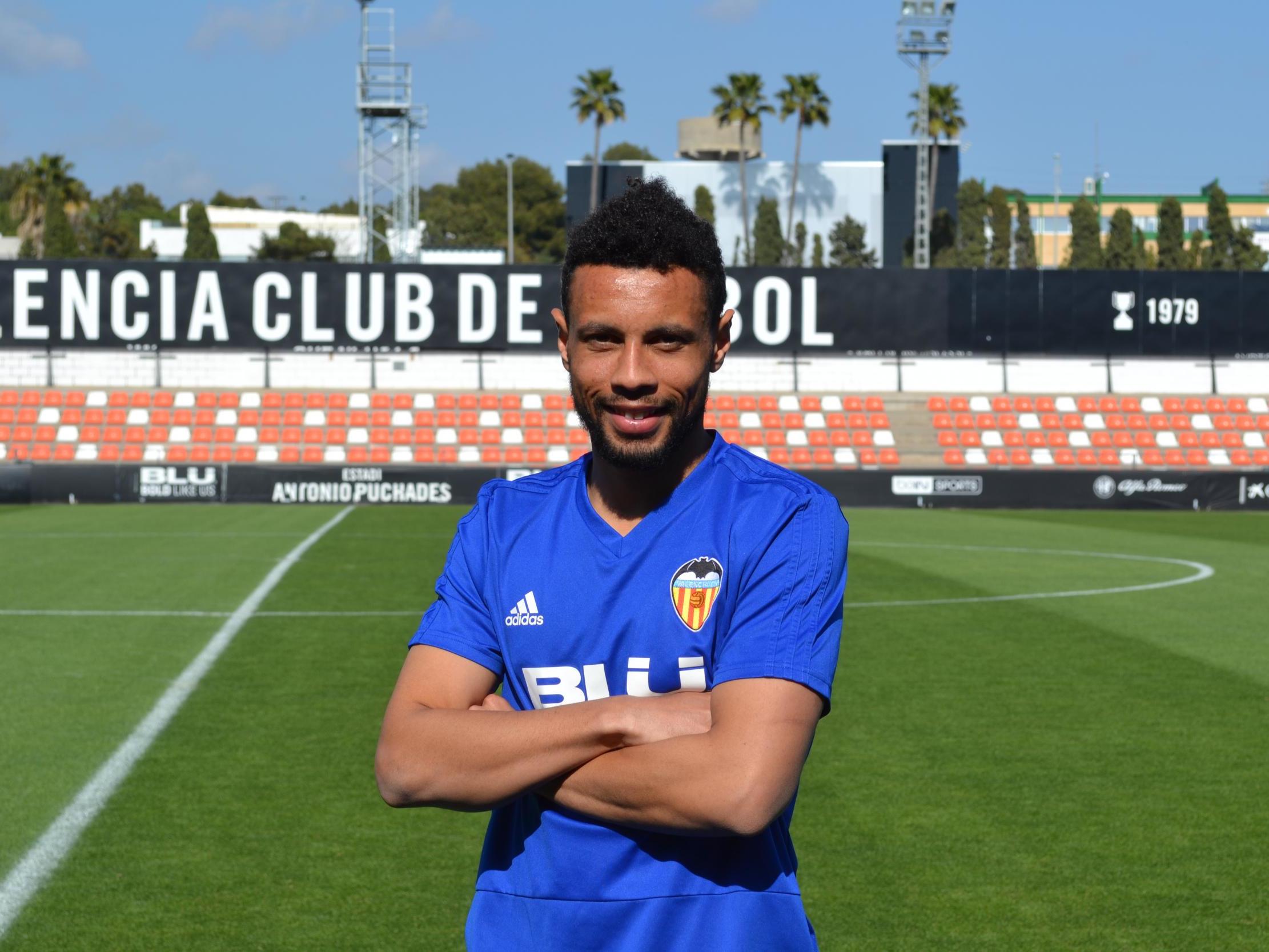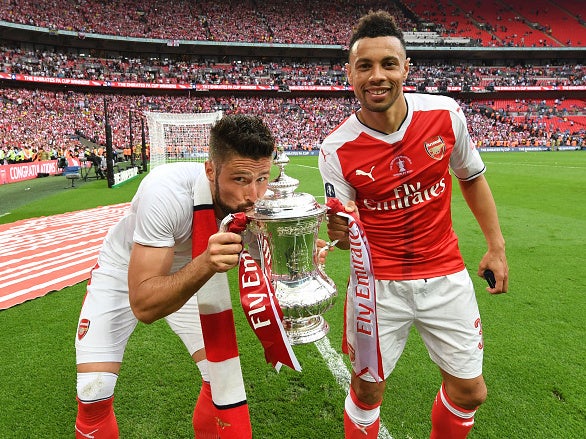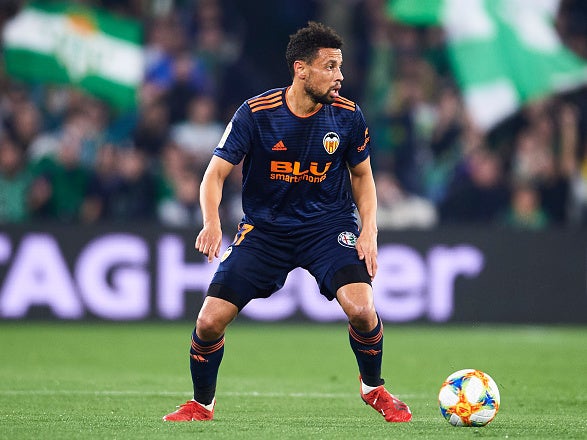Francis Coquelin interview: ‘At Arsenal I became a man, it is in my DNA. At Valencia, I’m ready to write history’
Exclusive interview: Fifteen months after leaving north London, the former Gunners midfielder is flourishing in Spain
As Francis Coquelin’s smile reflects in the mirrored glass which shields the Paterna training ground from a merciless sun, it’s easy to understand how Valencia has left the former Arsenal midfielder’s nine-year stint in north London seeming like “another life” altogether.
The £12m decision to follow the sea breeze to this paradisal corner of southeastern Spain 15 months ago was “not one to think twice about”, and the 27-year-old Frenchman, still cropped with the same Mohican and styled by an English twang no doubt courtesy of a close friendship with Jack Wilshere, has embraced the technicalities of Spanish football.
Coquelin looks back fondly on his time at Arsenal, recalling the trials of leaving Stade Lavallois, a small-tier club in a quaint medieval town in western France to join the academy aged 17; the indescribable highs of lifting the FA Cup in 2015 and 2017; the enduring loan spells and even the distressing 8-2 defeat to Manchester United.
It’s a bond, he admits, that is so defining and deep-rooted that it will never leave him. “Arsenal is always going to be in my DNA,” he says. “I can’t deny it. It wasn’t just the football or the players, it was where I grew as a person and where I became a man. It will always be a big part of me and I’ll never forget it.”
But he also acknowledges that with his departure came a renewed sense of freedom, and after six months spent idling on the fringes of the team as Arsenal succumbed to a disastrous slump and the Emirates warped in toxicity towards the manager, it was “the right moment” move on.
“I had great moments at Arsenal, and every decision is difficult, but I had no regrets. Maybe I would if I hadn’t had the chances to play, but I got to show what I can do. I had the opportunity to join another massive club and it was the right time to leave my comfort zone. I never doubted my qualities and I think I’ve been able to show that here.”
“In England, one day you can be up and the next you can be really low. When you play football that can always happen and you have to be prepared for it. You play one great game and you’re up here,” he says, smiling towards the Valencia sun. “The next,” he says, now scratching at the toe of his trainer, “you can be at the bottom.”

Coquelin’s spiteful on-pitch demeanour softens as he stresses his thanks to Arsene Wenger. The man who he describes as a “father figure” and points to how Wenger talked him through the toughest moments - the 8-2 defeat on his full Premier League debut and an ill-fated loan move to Freiburg - which might have otherwise proven psychologically damning to a player of less resilience. He expresses a genuine sadness at how the manager’s reign unravelled during that final season, and a desire to have somehow done something more.
“It was a rough season for the boss, but we were always fighting for him,” he says. ”The atmosphere was strange because half of the fans wanted him to go, the others wanted him to stay, but I can understand because they want results. It was difficult for him and I would have wanted him to have a better exit.”
“I’ll never forget what he gave me,” he continues. “He was massive for me those nine years and I will only ever speak highly of him. He brought me to England when I was 17. He gave me my first chance. I hope now he has retired from Arsenal everyone will remember what he’s done for the club.”

Now unshackled from that restrictive role as a disruptive ball-winning anchor in Arsenal's midfield, Coquelin has demonstrated that he is more than just a robust presence in a league where he wields uncommon physicality. Under the tutelage of manager Marcelino, he has evolved into a dynamic box-to-box midfielder, capable of imposing his own creative influence on the game, and has flourished this season after recovering from the ACL injury that marred his arrival.
“I think the manager has improved me massively,” he says. “I had a different role at Arsenal. I was playing defensive midfield and with the quality of Mesut [Ozil] and Santi [Cazorla], my quality wasn’t much required. Here, Marcelino gave me the confidence to get on the ball a lot more and create through the middle. I think he has improved every aspect of my game. I have been blessed to have two great managers in my career.”

Even if Coquelin’s departure came with the recognition that he couldn’t quite establish himself as an integral member of the first team at Arsenal, on current evidence his career with Valencia could scarcely be interpreted as a step-down. Wrestling with a muscle strain suffered in training the day before we met, he is desperate to return in time to help Valencia seal Champions League qualification, before the club attempt to end an 11-year trophy drought against Barcelona in the final of the Copa del Rey. “I’ve got another part of me here now,” he says, with an excitable glint in his eye. “And now I want to write a piece of history this year.”
And what if Valencia and Arsenal both progress in their Europa League games to set up a semi-final between the two clubs that share his heart? “Every round, I’ve wanted to draw them,” he says, only out of sentimental affection. “It would be very special, something emotional. It would make me very happy.”
Join our commenting forum
Join thought-provoking conversations, follow other Independent readers and see their replies
Comments
Bookmark popover
Removed from bookmarks